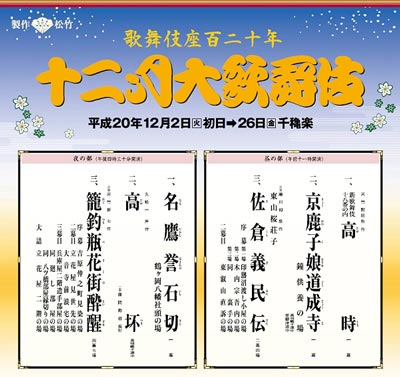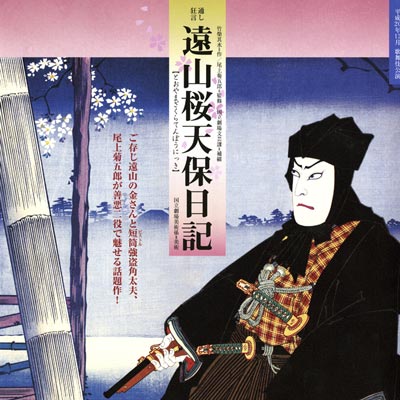| DECEMBER 2008 |
|
2 shows in Ky˘to (Minamiza), 3 in T˘ky˘ (Kabukiza, National Theatre) and 1 tour (Nakamura Kantar˘/Nakamura Shichinosuke Special Tour)!
|
|
|||
| Dates | 30 November ~ 26 December 2008 (Kichirei Kaomise K˘gy˘ Kabuki) | ||
| MatinÚe |
Hachijin Shugo no Honj˘ (Kosui Gozabune) |
||
| Evening |
Keisei Hangonk˘ (Domo Mata) Genroku Chűshingura Shinano Momiji no Onizoroi |
||
| Casting |
Sakata T˘jűr˘, Kataoka Nizaemon, Band˘ Tamasabur˘, Nakamura Kichiemon, Ichikawa Ebiz˘, Nakamura Shibajaku, Nakamura Kanjaku, Kataoka Gat˘, Kataoka Hidetar˘, Nakamura Senjaku, Nakamura Kinnosuke, Kataoka Takatar˘, Kataoka Ainosuke, Ichikawa Monnosuke, Ichikawa Emiya, Ichikawa Emisabur˘, Ichikawa Shun'en, Nakamura Karoku, Nakamura Kash˘, Band˘ Takesabur˘, Kamimura Kichiya, Sawamura Yoshijir˘, Kataoka Shinnosuke, ďtani Keiz˘, Nakamura Tanetar˘ |
||
| Comments |
|
||
|
|||
| Dates | 2 ~ 26 December 2008 (Jűnigatsu ďkabuki) | ||
| MatinÚe | |||
| Evening | |||
| Casting |
Matsumoto K˘shir˘, Band˘ Mitsugor˘, Nakamura Tomijűr˘, Nakamura Baigyoku, Nakamura Kaishun, Nakamura Fukusuke, Band˘ Hikosabur˘, Ichikawa Danshir˘, Nakamura T˘z˘, Band˘ Yajűr˘, Ichikawa Somegor˘, Ichikawa Komaz˘, ďtani Tomoemon, Nakamura Matsue, Nakamura Takanosuke |
||
| Comments |
|
||
 |
|||
| National Theatre (T˘ky˘) |
| Dates | 3 ~ 26 December 2008 |
| Program | |
| Casting |
Onoe Kikugor˘, Nakamura Tokiz˘, Onoe Kikunosuke, Onoe Sh˘roku |
| Comments |
There are few characters in TV samurai dramas more popular than T˘yama Kinshir˘, commonly called T˘yama no Kin-san. The city magistrate in charge of judging criminal cases, he also goes around the world of commoners incognito. Then, in court, when the criminals try to say they are innocent, Kin-san says that he knows of their guilt from direct knowledge and exposes his distinctive tattoo. The stories about T˘yama no Kin-san are mostly fictional, but he was a historical figure and from the end of the 19th century, he became a popular figure for plays and stories. One of these plays will be revived at the National Theatre in December, featuring all the talents of the Onoe Kikugor˘ Theatre Troupe. This full-length play features Onoe Kikugor˘ in the contrasting roles of the magistrate T˘yama Kinshir˘ and the villainous Ikuta Kakudayű, a former samurai who becomes a notorious thief wielding a pistol and then disguises himself as a blind masseur. As the pistol wielding thief, he becomes so notorious that he decides to let someone else take the blame, a defrocked Buddhist priest named Tengaku (Onoe Sh˘roku). But in the end, this seals his fate. Source: Earphone Guide website |
 |
|
| Nakamura Kantar˘/Nakamura Shichinosuke Special Tour | |
| Dates | 30 November ~ 12 December 2006 |
| Program |
Geidan Fűryűjin Yuki Keisei |
| Casting | |
| Comments |
This short tour stars the two young stars Nakamura Kantar˘ and Nakamura Shichinosuke. The second item in this program is a speech about the art of Kabuki. The tour goes through T˘ky˘ (Bunky˘ Civic Hall), ďsaka, Nagoya, Nagaoka, Sendai, Shizuoka, Funabashi, Nagasaki and Kumamoto. |
|
|
| Contact | Main | Top | Updates | Actors | Plays | Playwrights | Programs | Links | FAQ | Glossary | Chronology | Illustrations | Prints | Characters | Derivatives | Theaters | Coming soon | News |
